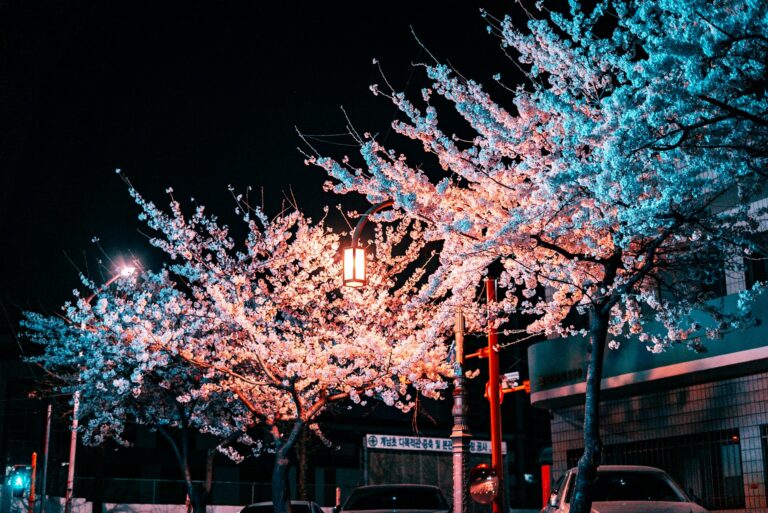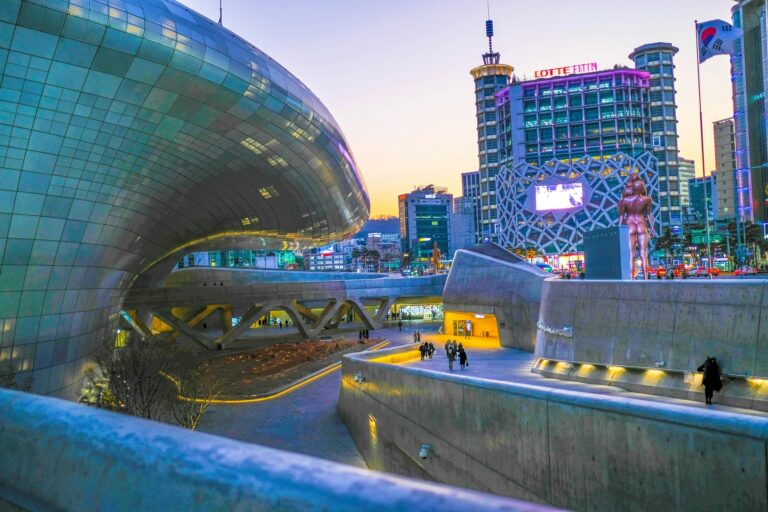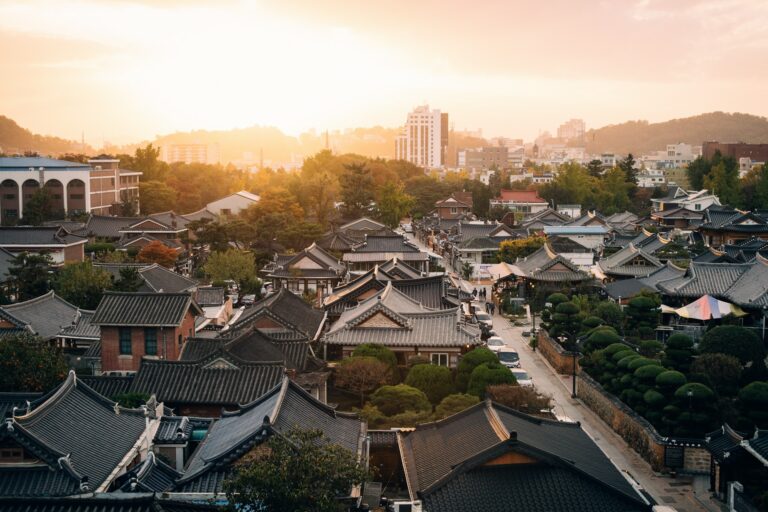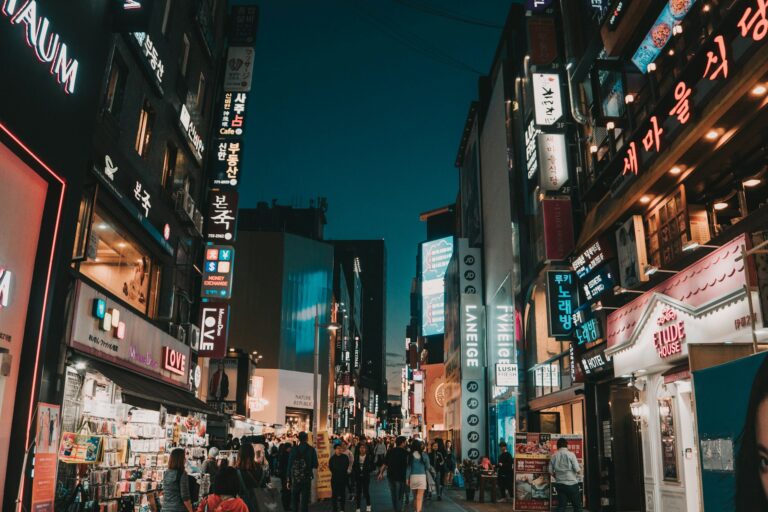- +971 56 601 7649, +971 4 284 0470
- Info@copacabanatravel.ae

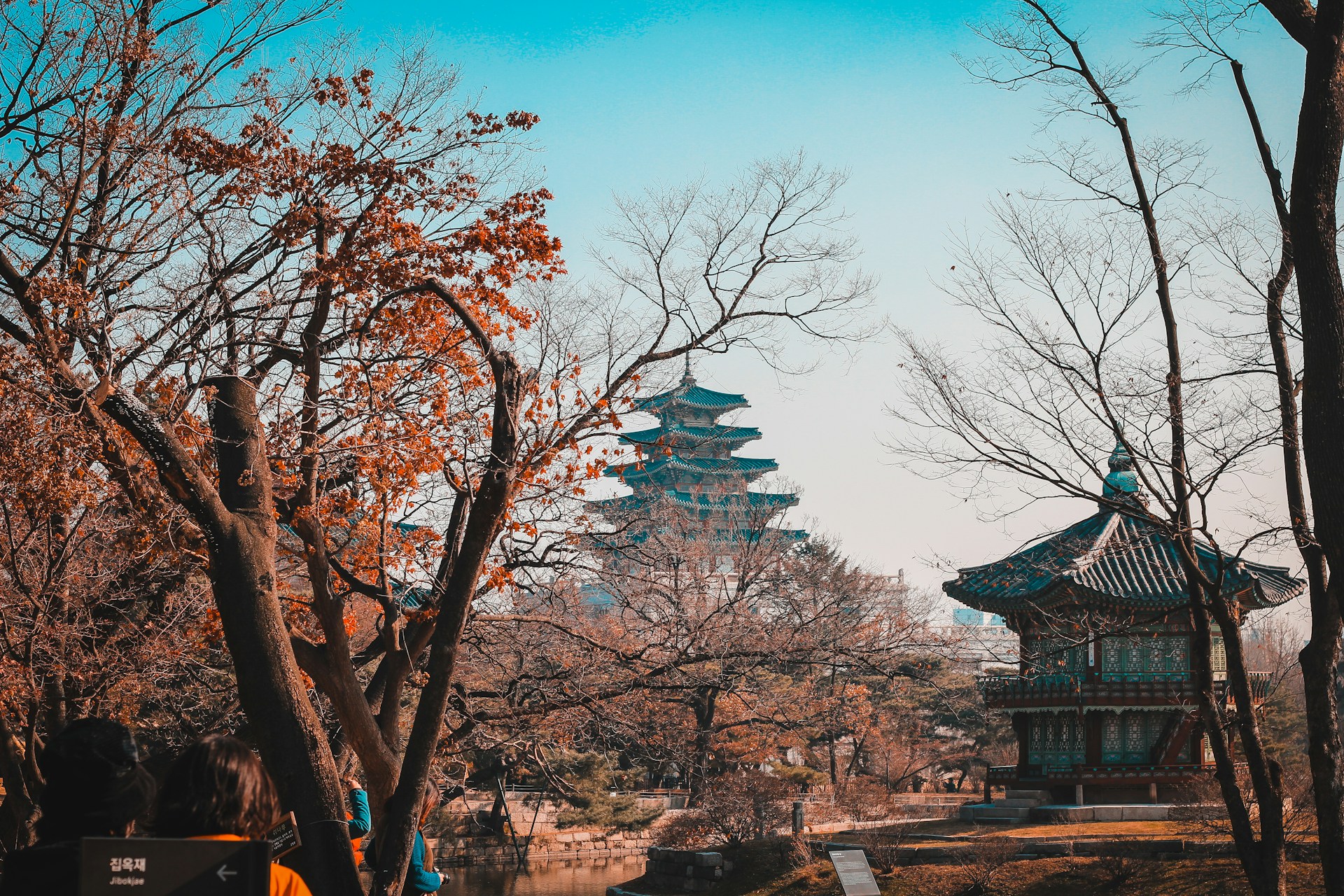
Introduction of Korea Seoul & Busan 7D6N
Day 1 -Seoul tour
- N Seoul tower observatory
Namsan Seoul Tower was the first multipurpose tower to be established in Korea, effectively incorporating a sightseeing observatory into a broadcasting tower. For the past 40 years, Namsan Seoul Tower has served as an iconic landmark of
Korea and a representative tourist attraction.
l Itaewon street
Itaewon Shopping Street is a 1.4-kilometer-long road located near Itaewon Station. There is an enormous variety of shops, entertainment venues, and restaurants lined along both sides of the street. As the neighborhood has a
reputation as a mini melting pot in Seoul where languages other than Korean are widely spoken, it is one of the most visited places by international visitors.
Day 2 -Seoul tour
- Gyeongbok palace & Korean folklore museum (wearing Hanbok)
Gyeongbokgung Palace was built in 1395 as the official palace of the Joseon dynasty by Yi Seong-gye, the future King Taejo and founder of the new regime.
Gyeongbokgung Palace is commonly referred to as the Northern Palace because of its location to the north, comparied to Changdeokgung Palace in the east and Gyeonghuigung Palace in the west. Gyeongbokgung Palace is arguably the most
beautiful and is the largest of all five palaces.
l Bukcheon Hanok village
Surrounded by Gyeongbokgung Palace, Changdeokgung Palace and Jongmyo Shrine, Bukchon Hanok Village is home to hundreds of traditional houses, called hanok, that date back to the Joseon dynasty. The name Bukchon, which literally translates to “northern village,” came about as the neighborhood lies north of two significant Seoul landmarks, Cheonggyecheon Stream and Jongno.
l Ikseondong street
Nestled in the heart of Seoul, Ikseon-dong is a hidden gem where tradition meets modern creativity. As one of the city’s oldest hanok (traditional Korean house) villages, it offers a unique blend of history, culture, and trendy cafés, boutiques, and restaurants.
l Myeongdong street
Myeong-dong is Seoul’s premier shopping and entertainment district, where bustling streets are filled with global fashion brands, trendy boutiques, and the latest K-beauty products. Beyond shopping, Myeong-dong is also a foodie’s haven, offering everything from sizzling Korean barbecue to delicious street food like tteokbokki, hotteok, and grilled squid.
l Nanta show or Saturday Korean traditional music concert (up to day of week)
Nanta show(show on weekdays and weekends): NANTA is Korea’s most popular non-verbal performance, combining high-energy percussion, comedy, and
dazzling acrobatics. Set in a bustling kitchen, the show follows a team of chefs as they turn everyday cooking utensils into musical instruments, creating an unforgettable rhythm-filled spectacle.
Saturday Korean traditional music concert(show on only Saturday): Experience the beauty and elegance of Korean traditional performing arts at the Saturday Premium Performance. Held at the National Gugak Center, this captivating show features a curated selection of Korea’s finest music, dance, and theatrical
performances.
Day 3 -Seoul tour
- Hikr ground (K-pop play ground)
Located inside the Korea Tourism Organization Seoul Center, HiKR Ground is a Korean tourism publicity center where visitors can experience K-pop and view media art at the same time. The name ‘HiKR Ground’ embodies the meaning that Korea (KR) will greet (“Hi”) global tourists and become a playground.
l Craft experience (Stamp making or Calligraphy on hand fan)
Unleash your creativity at the Eorayeon Pavilion Experience Center, where
tradition meets artistry. Join the Stamp-Making experience to craft your very own personalized seal, a unique keepsake inspired by Korea’s rich heritage. Carve your name or a special design and take home a meaningful souvenir.
In the Calligraphy Experience, immerse yourself in the beauty of Korean script. Learn the graceful strokes of traditional calligraphy and create your own masterpiece with expert guidance.
l National museum of Korea
The National Museum of Korea houses a vast collection of over 420,000 artifacts from ancient times to the modern era in a wide range of topics, including art and culture. The museum houses a Children’s Museum, where visitors can learn more about the nation’s history through educational programs and experiences.
Day 4-Busan tour
- Skyline luge (3 riding pass)
Get ready for an unforgettable adventure at Skyline Luge Busan! Located in the beautiful Osiria Tourism Complex, this exciting gravity-powered ride lets you race down specially designed tracks with breathtaking coastal views. Whether you’re a thrill-seeker or looking for family-friendly fun, Skyline Luge offers a unique and safe experience for all ages.
l Haedong Yonggungsa temple
Haedong Yonggungsa Temple is situated on the coast of the north-eastern
portion of Busan. This superb attraction offers visitors the rare find of a temple along the shore line as most temples in Korea are located in the mountains.
Haedong Yonggungsa Temple was first built in 1376 by the great Buddhist teacher known as Naong during the Goryeo dynasty.
l Blueline coastal train
Take a relaxing journey along Busan’s stunning coastline with the Blue Line Park Beach Train. This charming coastal train runs between Mipo and Songjeong, offering breathtaking ocean views and a peaceful escape from the city. Glide along the old railway tracks, passing famous spots like Cheongsapo and Dalmaji Tunnel, where you can capture unforgettable moments.
l Yacht riding
Set sail on a breathtaking Busan Yacht Tour and explore the city’s stunning coastline from the sea. Cruise past famous landmarks while enjoying the
refreshing ocean breeze. Whether you choose a romantic sunset cruise, a thrilling night tour, or a relaxing daytime ride, this yacht experience offers the perfect
way to see Busan in style.
l Haeundae beach
Haeundae Beach is the most famous beach in Busan. The white sand beach is roughly 1.5 kilometers long, over a 30- to 50-meter wide area, creating a beautiful coastline before a shallow bay, making it perfect for swimming.
People flock to Haeundae Beach every summer.
Day 5- Gyeongju tour(1h from Busan)
- Bulkuksa temple & Seokguram grotto
Step into history at Bulguksa Temple and Seokguram Grotto, two UNESCO World Heritage Sites that showcase the artistic and spiritual legacy of Korea’s ancient Silla Kingdom. Bulguksa Temple, built in the 8th century, is a masterpiece of Buddhist architecture, featuring elegant stone pagodas, intricate wooden
structures, and a serene atmosphere.
l Tumuli park
Explore the ancient royal tombs of the Silla Dynasty at Daereungwon Tomb Complex, one of Gyeongju’s most iconic historic sites. This vast park features
large, grass-covered burial mounds, where Silla kings, queens, and nobles were laid to rest over a thousand years ago. Among them, Cheonmachong Tomb, famous for its exquisite golden artifacts, offers a rare glimpse into the splendor of Silla’s royal culture.
l Hwanglidan street
Hwangnidan-gil is a charming and trendy street located in the heart of Daegu, known for its unique blend of traditional and modern vibes. This area is filled with stylish cafes, boutique shops, and artisanal stores, making it a perfect destination for those looking to experience both the old and new side of the city.
l Donggung palace & Wolji pond
Once a royal palace of the Silla Dynasty, Donggung Palace and Wolji Pond is a breathtaking historical site that comes alive, especially at night. Originally built in the 7th century, this palace served as a residence for crown princes and a venue for grand banquets. The beautifully illuminated Wolji Pond reflects the elegant
pavilions, creating a magical scene that captures the essence of Silla’s golden age.
Day 6- Busan tour
- Arte museum
Step into a world of stunning digital art at ARTE Museum Busan, an immersive media art exhibition that brings nature and imagination to life. Created by
d’strict, this breathtaking space features large-scale digital installations with vibrant visuals, mesmerizing sounds, and captivating themes inspired by the ocean.
l Gamcheon culture village
Nicknamed the “Machu Picchu of Busan,” Gamcheon Culture Village is a vibrant hillside village known for its colorful houses, artistic murals, and scenic alleyways.
Once a quiet mountainside community, it has transformed into a must-visit cultural destination, filled with galleries, cafés, and quirky art installations.
l Nampo area (BIFF square, Jagalchi fish market)
BIFF square: Located in the heart of Busan, BIFF Square is a vibrant cultural destination where the spirit of cinema comes alive. Named after the renowned Busan International Film Festival, the square is surrounded by bustling streets filled with shops, cafes, and entertainment. It’s a perfect spot to soak in the local culture, enjoy delicious street food, and explore the iconic handprints of famous movie stars.
Jagalchi fish market: A visit to Busan wouldn’t be complete without exploring Jagalchi Market, Korea’s largest and most famous seafood market. Nestled along the waterfront, the market offers an authentic experience with a wide variety of
fresh seafood. Enjoy local delicacies like sashimi, grilled fish, and hot seafood stews, all while witnessing the lively atmosphere of this iconic market.
Day 7-Seoul tour
- Jingwansa temple
Jingwansa Temple is one of the four Buddhist temples that surround Seoul. It was known as the center of Buddhism and academics. Jingwansa Temple is home to a variety of buildings, such as Daeungjeon Hall, Myeongbujeon Hall, and Nahanjeon Hall, all surrounded by the beautiful nature of Bukhansan Mountain.
l Eunpyeong Hanok village
Located in Jingwan-dong of Eunpyeong-gu, the Eunpyeong Hanok Village
captures a quaint, serene landscape with the Bukhansan Mountain serving as the backdrop for the modern, neatly-built hanoks. If you take a snapshot from the middle of the road between the tall hanok structures, it’ll give you the feeling of standing on the set of some historical film set during the Joseon Dynasty.
- Hotel Accommodation: 4-star hotels (Seoul Orakai Daehakro Hotel or similar)
- Transportation: Air-conditioned buses (max 10 hours/day)
- Meals: Breakfast, Lunch, and Dinner (as specified)
- English-speaking Guide
- Admission Fees: For listed attractions and activities
- Craft Experiences: Stamp Making or Calligraphy on Hand Fan
- Activities: DMZ, Han River Cruise, K-pop Playground, Nanta Show, and more
Not Included
- International & Domestic Flight Tickets
- Airport Tax
- Traveler Insurance
- Personal Expenses: Souvenirs, food, drinks, etc.
- Excess Baggage
- Water: Two bottles per day
- Meals not specified: Meals outside the specified schedule
- Additional Charges: For extra services (e.g., Saturday & Pre-Holiday Supplement)
Additional Charges
- Single Supplement:
- Normal Season: $60 per person, per night
- Peak Season: $75 per person, per night
- Saturday & Pre-Holiday Supplement: $16 per person, per night
Child Fee
- With Bed (Ages 2-11): 100% of adult tour fee
- Without Bed (Ages 2-11): 50% of adult tour fee
- Infant (Ages 0-2): Free
Cancellation Policy
- Up to 30 days prior to travel: No Cancellation Fee
- 29-8 days prior to travel: 30% of the specified fare
- 7-2 days prior to travel: 50% of the specified fare
- 1 day before travel: 100% of the specified fare
- On the date of travel: 100% of the specified fare
- No-Show: 100% of the specified fare
- Note: Except for natural disaster reasons, all cancellations are subject to the policy
Seasonal Information
- Peak Season: March, April, October, November (Spring & Autumn in Seoul)
- Blackout Dates: December 20, 2025 – January 4, 2026

